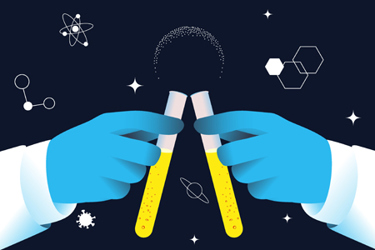Immunome's Platform Partnership Potential

By Matthew Pillar, Editor, Bioprocess Online

When I hosted Immunome President & CEO Purnanand Sarma, Ph.D. on episode 104 of the Business of Biotech podcast last summer, the company, like many emerging biotechs, was still wrapped up in rationalizing an application for its antibody technology in the battle against COVID-19. It had also just climbed out of a clinical hold that the FDA had placed on its IMM-BCP-01, a three-mAb-cocktail designed for the treatment of COVID. Dr. Sarma, vigilant biopharma business leader that he is, was resolute and seemingly unscathed.
Here we are a few quarters later, and Sarma’s resolve appears to be bearing fruit. The scene at Immunome is starkly different that it was nine months ago. The Company is now seeking a partner for IMM-BCP-01 while the company continues a quiet reversion to its drug discovery and pre-clinical development roots, refining its Discovery Engine platform technology with a focus on oncology. It’s making some well-heeled friends in the process.

In a constricted capital market such as this, that kind of non-dilutive capital can be transformative for a small biotech. We caught up with Sarma and Immunome Chief Financial Officer Corleen Roche to learn more about the deal, how it came together, and how it’s being executed.

Sarma makes no bones about courting AbbVie. “Our business development group talks to a lot of potential partners, and AbbVie has been a high priority among them,” he says. “They’re obviously a very credible company with a lot of great science.” It’s not uncommon at all for an early-stage biotech to court AbbVie, but the courtship is not reciprocated if the science isn’t deemed worthy. Immunome’s discovery engine learns from observation of the body’s immune system. When B cells generate antibodies, for example, directed at antigens on a specific pathogen, they mark those invading cells for destruction. That “signal beacon” then alerts other immune cells, and mining of data associated with the immunological activity results in information that Immunome believes can go a long way toward novel target identification for antibody-based treatments to fight against cancer and infectious diseases.
Sarma says that he expects the day-to-day discovery work at Immunome to remain largely unchanged, with a few important caveats at the hands of the deal with AbbVie. “The work we do in this partnership will be collaborative with input from deals take a long time to develop and consummate. This is true of any partnership. You don’t want to generate a whole set of data that’s pointing in one direction, only to find that your partner wanted to take the program in a different direction. Those parameters need to be established and rationalized, and the ongoing work needs to be transparent and accessible.”
Once a target and antibody are identified, they’re handed over to AbbVie for development, optimization, clinical activity, and beyond. Immunome is eligible to receive development and first commercial sale milestones of up to $120 million per target with respect to certain products derived from target-antibody pairs that AbbVie elects to purchase. That’s in addition to the potential for further sales-based milestones and tiered royalties on global sales should one of its candidates be approved.
Sarma says except for, perhaps, a few new hires, the deal doesn’t require Immunome to acquire any technology or intellectual property it doesn’t already have.
How The Deal Grows Immunome
While the deal with AbbVie was a definitive move for Immunome’s future, the company maintains an internal, proprietary development effort as well. It’s eying a mid-2023 IND submission for its pre-clinical oncology asset IMM-ONC-01, an anti-IL-38 antibody it’s exploring for squamous head & neck, gastroesophageal, and lung cancers. Its research-stage IMM20059 Anti-EPN1 candidate is being explored in melanoma, breast, lung, genitourinary, and liver cancer cells, and more undisclosed solid tumor oncology targets are coming on its heels, including potential additional ADC targets.
The strategy at Immunome is to build all its development efforts—internal and partnered projects—around the nucleus of its platform. That’s the first of what Sarma describes as the company’s two axes. “The platform is applicable across multiple therapeutic areas, with a track record of supporting a developmental collaboration with the DOD on COVID-19. Now we’ve partnered with AbbVie on certain solid tumors. We believe the platform has applicability in hematological cancers and autoimmune disorders. Its therapeutic utility is broad, and as a small company, we can’t possibly play in all those therapeutic areas. So, we’ll continue to seek partnerships for platform access,” he says.
That said, Sarma reveals that Immunome also intends to remain an oncology therapeutics company with its own pipeline. He says there are proprietary oncology programs that Immunome intends to advance into the clinic on its own, and that the capital earned from collaborative efforts helps to cover some of those expenses. He also points to a less direct, but equally valuable benefit of the platform: honing its play in the solid tumor space. “The insight gleaned from the platform gives us an ability to step back and think about what proprietary program development might look like,” he says. “We don’t have antibody drug conjugate chemistry technologies, for instance. But are there services we can outsource to keep development internal if we choose to pursue an ADC? Would that align with our size and aspirations? Or should we partner in that space? I won’t rule out advancing our own programs, but partnerships will remain a key element of our strategy. Therein lies the beauty of partnership,” says Sarma.
Of course, sussing out which targets to pocket and which to pursue via the partnership can get sticky if you let it. For that, says Sarma, you need scruples, backed up by contracts and good lawyers. “If our technology can find a great target, I want the patient to benefit. If the best path to that end and to maximize shareholder value is partnership, I’ll do everything in my power to enable that.”
The CFO’s Partnership Perspective
Corleen Roche is Chief Financial Officer at Immunome. Prior to joining the company, she held similar roles for Biogen, Sandoz, and Wyeth with a strong R&D finance background at Sanofi. That experience gives her multiple perspectives on the AbbVie deal—she’s often run financial point for the backer, and now, with Immunome, she’s running point for the backed. At Immunome, the business development effort falls under her leadership too, so she played a leading role in negotiations with AbbVie. “We are honored that AbbVie has chosen Immunome to share in their mission to discover and deliver innovative medicines that solve serious health issues today and address the medical challenges of tomorrow,” says Roche.
Of course, she also acknowledges that it’s a beneficial financial deal for Immunome. But she and Sarma agree that business development and finance opportunities there follow the function of the platform, not vice versa. “We don’t silo the business development and R&D functions,” says Sarma. “In fact, R&D played a role in the valuation of the platform. It’s not a situation where Corleen is pressuring R&D to perform up to the financial expectations of the deal,” he says. “She lets the process drive the deal, so that people who are committing to the work can quantify the effort. That’s the template. It’s not top-down, it’s bottom-up.”
Learn more about Immunome at www.immunome.co
